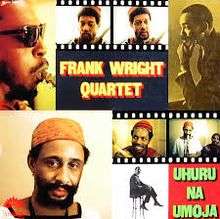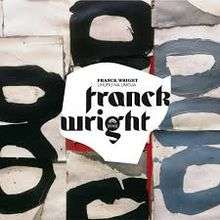Uhuru na Umoja
Uhuru na Umoja (in Swahili "Freedom and Unity") is an album by American free jazz saxophonist Frank Wright recorded in 1970 in Paris, originally released on the French America label and reissued on CD in 2004 by Universal France. Wright leads a quartet featuring alto saxophonist Noah Howard, who composed each of the tracks, pianist Bobby Few and bebop drummer Art Taylor in his first free jazz date.[1] "Oriental Mood" and "Aurora Borealis" are the same compositions as "Mount Fuji" and "Queen Anne", from Howard's The Black Ark album.
| Uhuru na Umoja | ||||
|---|---|---|---|---|
 | ||||
| Studio album by | ||||
| Released | 1970 | |||
| Recorded | 1970 | |||
| Studio | Paris | |||
| Genre | Jazz | |||
| Length | 33:52 | |||
| Label | America | |||
| Producer | Pierre Berjot | |||
| Frank Wrigth chronology | ||||
| ||||
| reissue cover | ||||
 | ||||
Reception
| Review scores | |
|---|---|
| Source | Rating |
| AllMusic | |
In his review for AllMusic, Sean Westergaard states "Wright's gruff tenor contrasts nicely with Howard's sweeter tone, which is not really less intense, just less ferocious.. Fans of '60s-style 'energy music' should really check this out."[2]
Track listing
All compositions by Noah Howard.
- "Oriental Mood" – 8:55
- "Aurora Borealis" – 7:43
- "Grooving" – 6:52
- "Being" – 6:28
- "Pluto" – 3:54
Personnel
References
- Uhuru na Umoja original liner notes by Valerie Wilmer
- Westergaard, Sean. Frank Wright – Uhuru na Umoja: Review at AllMusic. Retrieved January 6, 2017.